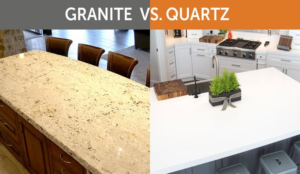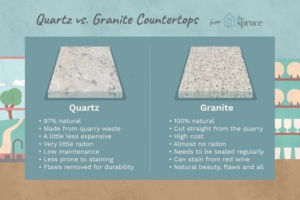When it comes to choosing the perfect material for your kitchen countertops, quartz and granite emerge as two prominent contenders. Both options boast distinct characteristics, advantages, and disadvantages, making the selection process a pivotal aspect of any kitchen renovation or construction endeavor. Let’s delve deeper into the fundamental disparities and factors to consider, enabling you to make a well-informed decision.
1. Appearance and Aesthetic Appeal
In terms of appearance and aesthetic appeal, granite countertops are revered for their natural allure and individualized patterns. Originating from natural stone, granite countertops exude a timeless charm, elevating the ambiance of any kitchen space. The inherent diversity in colors and patterns ensures that each granite slab possesses a distinctive character, making it a favored option for homeowners desiring a unique and personalized look.

Conversely, quartz countertops are crafted from engineered stone, typically comprising around 90% quartz crystals along with 10% resins and pigments. While certain quartz countertops emulate the natural beauty of stones like granite, others offer a more consistent appearance with uniform patterns and hues. This versatility allows quartz countertops to deliver a contemporary aesthetic that harmonizes effortlessly with a variety of kitchen styles, ranging from sleek and modern to understated and minimalist.
2. Durability and Maintenance
In terms of durability and maintenance, granite is widely acclaimed for its robustness and ability to withstand scratches, heat, and stains. With proper sealing, granite countertops exhibit remarkable resilience against daily wear and tear, rendering them an optimal choice for bustling kitchen environments. It’s imperative to periodically reseal granite countertops to uphold their protective barrier and prevent the infiltration of stains.

On the other hand, quartz, as an engineered material, boasts inherent non-porous properties, rendering it highly resistant to stains, scratches, and heat. Unlike granite, quartz countertops do not necessitate sealing, streamlining the maintenance process. Furthermore, their non-porous nature minimizes the risk of bacterial proliferation, making quartz countertops an inherently hygienic option for food preparation areas.
3. Cost Considerations
When it comes to cost considerations in the comparison between granite and quartz countertops, affordability holds significant sway for many homeowners. Granite countertops typically vary in price, influenced by factors such as the rarity, color variations, and thickness of the slab. While granite can sometimes be more budget-friendly than quartz, certain high-end granite varieties might be comparable or even pricier than quartz options.

On the other hand, quartz countertops generally offer a more consistent pricing structure compared to granite. Although the initial installation costs for quartz may surpass those of granite in some cases, its durability and minimal maintenance needs can translate into long-term savings. Moreover, the widespread availability of quartz countertops ensures that homeowners can find options that align with their budgetary constraints more readily.
4. Environmental Impact
In considering the environmental impact of countertop materials, the concerns of eco-conscious consumers are gaining prominence. Granite, being a natural stone, necessitates quarrying from the earth, a process that can have significant environmental repercussions including habitat destruction and high energy consumption during extraction and transportation.

In contrast, quartz, although also requiring mining and manufacturing processes, frequently incorporates recycled materials, thus diminishing its environmental footprint. Furthermore, certain quartz manufacturers place emphasis on sustainable practices, providing eco-friendly options tailored for environmentally conscious consumers. These initiatives can include sourcing materials responsibly, minimizing energy consumption during production, and implementing recycling programs to reduce waste.
Conclusion
In conclusion, the decision between quartz and granite for your countertops hinges on evaluating a range of factors, including appearance, durability, cost, and environmental impact. Both materials present distinct advantages and aesthetic qualities, which contribute to their popularity in kitchen renovations and new constructions alike. Ultimately, the choice is guided by your individual preferences, budget considerations, and lifestyle requirements.
Whether you gravitate towards the natural allure of granite or prioritize the durability and minimal maintenance offered by quartz, selecting the ideal countertop material is pivotal in enhancing both the functionality and visual appeal of your kitchen space for years to come. By carefully weighing these considerations and aligning them with your personal priorities, you can confidently make a decision that complements your lifestyle and contributes to the long-term enjoyment of your kitchen environment.

One response to “Choosing Between Quartz and Granite: Finding the Perfect Countertop Material”
I have observed that in digital cameras, exceptional sensors help to concentrate automatically. Those sensors associated with some video cameras change in contrast, while others use a beam with infra-red (IR) light, specifically in low lumination. Higher standards cameras from time to time use a mixture of both programs and may have Face Priority AF where the digital camera can ‘See’ the face and concentrate only on that. Thanks for sharing your opinions on this blog site.